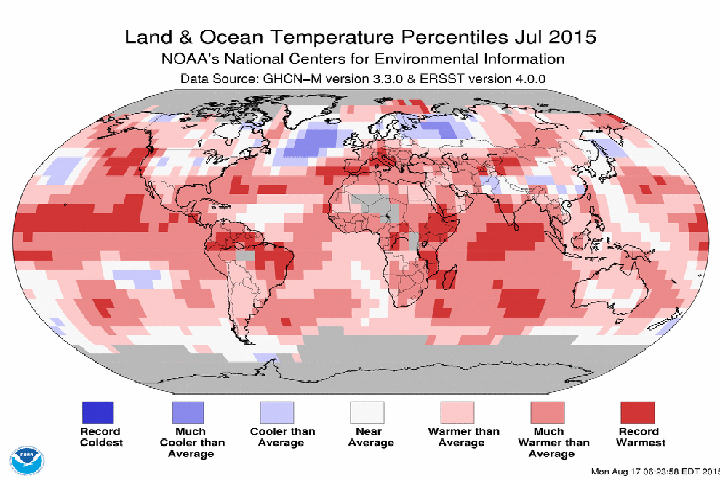WASHINGTON – Earth just keeps getting hotter. July was the planet’s warmest month on record, smashing old marks, U.S. weather officials said.

And it’s almost a dead certain lock that this year will beat last year as the warmest year on record, they said.
READ MORE: Study finds no ‘hiatus’ for global warming as temperatures rise
July’s average temperature was 16.6 C, beating the previous global mark set in 1998 and 2010 by about one-seventh of a degree, according to figures released Thursday by the National Oceanic and Atmospheric Administration. That’s a large margin for weather records, with previous monthly heat records broken by a 20th of a degree or less.
“It just reaffirms what we already know: that the Earth is warming,” said NOAA climate scientist Jake Crouch. “The warming is accelerating and we’re really seeing it this year.”
NOAA records go back to 1880. Separate calculations by NASA and the Japanese weather agency also found July 2015 to be a record.
The first seven months of 2015 were the hottest January-to-July span on record, according to NOAA. The seven-month average temperature of 14.7 C is 1.53 degrees warmer than the 20th-century average and a sixth of a degree warmer than the old record set in 2010.
Given that the temperatures have already been so high already — especially the oceans, which are slow to cool — NOAA climate scientist Jessica Blunden said she is “99 per cent certain” that 2015 will be the hottest on record for the globe. The oceans would have to cool dramatically to prevent it, and they are trending warmer, not cooler, she said.
Crouch, Blunden and other scientists outside of the government said these temperatures are caused by a combination of man-made climate change and a strong, near-record El Nino. An El Nino is a warming of the equatorial Pacific Ocean that alters weather worldwide for about a year.
READ MORE: ‘Bruce Lee’ El Nino already nearing record levels, could end up as one of the most potent ever
The oceans drove the globe to record levels. Not only were the world’s oceans the warmest they’ve been in July, but they were 0.75 C degrees warmer than the 20th-century average.
The heat hit hard in much of Europe and the Middle East. It was the hottest July on record in Austria, where records go back to 1767. Parts of France had temperatures that were on average 7 degrees above normal and temperatures broke 100 in the Netherlands, which is a rarity. And an Iranian city had a heat index of 74 C, which was still not quite record.
READ MORE: June, first half of year break Earth’s heat records: US agency
Nine of the 10 hottest months on record have happened since 2005, according to NOAA. Twenty-two of the 25 hottest months on record have occurred after the year 2000. The other three were in 1998 and 1997.
This shows that despite what climate change doubters say, there is no pause in warming since 1998, Blunden said.
It doesn’t matter if a month or a year is No. 1 or No. 2 or No. 5 hottest on record, said University of Georgia climate scientist Marshall Shepherd.
“The records are getting attention but I worry the public will grow weary of reports of new records each month,” Shepherd said in an email. “I am more concerned about how the Earth is starting to respond to the changes and the implications for my children.”



Comments